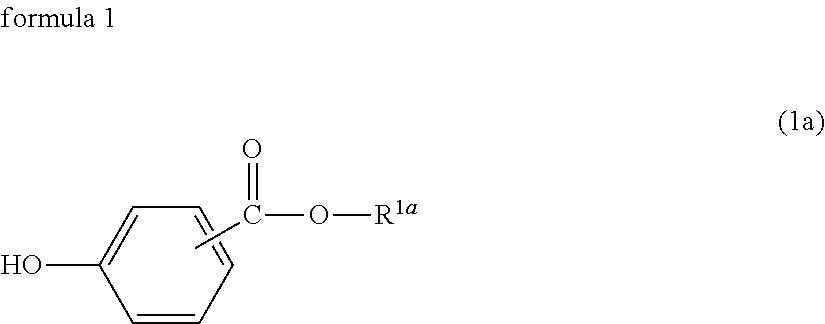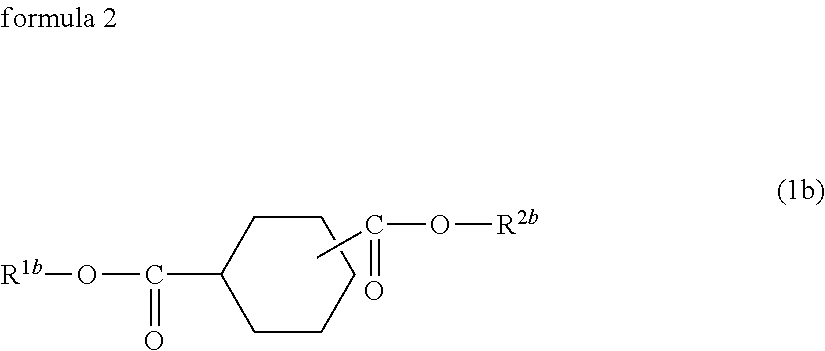Oil agent for carbon fiber precursor acrylic fiber, oil composition for carbon fiber precursor acrylic fiber, processed-oil solution for carbon-fiber precursor acrylic fiber, and method for producing carbon-fiber precursor acrylic fiber bundle, and carbon-fiber bundle using carbon-fiber precursor acrylic fiber bundle
a technology of oil agent and precursor acrylic fiber, which is applied in the direction of synthetic polymer filament chemical after-treatment, fiber treatment, textiles and papermaking, etc., can solve the problems of fuzzy fibers or yarn breakage, high viscosity, and difficulty in reducing and achieve excellent bundling properties and excellent mechanical properties. , the effect of preventing the lowering of the operating efficiency and fusion ra
- Summary
- Abstract
- Description
- Claims
- Application Information
AI Technical Summary
Benefits of technology
Problems solved by technology
Method used
Image
Examples
example 1-1
(Preparing Oil Agent Composition and Processed-Oil Solution)
[0450]Ester compound (A-1) and ester compound (B-1) were mixed and stirred to prepare an oil agent. Nonionic surfactants (K-1, K-3) were added to the mixture and stirred to prepare an oil agent composition.
[0451]After the oil agent composition was thoroughly stirred, ion-exchange water was further added to set the concentration of the oil agent composition at 30 mass %, and the mixture was emulsified by a homo-mixer. The mean particle diameter of the micelles at that time was measured by a laser diffraction / scattering particle-size distribution analyzer (brand name: LA-910, Horiba Ltd.) and found to be approximately 3.0 μm.
[0452]Next, using a high-pressure homogenizer, the oil agent composition was dispersed until the mean particle diameter of the micelles became 0.3 μm or smaller, and an emulsion of the oil agent composition was obtained. The emulsion was further diluted with ion-exchange water to prepare a processed-oil s...
examples 1-[UNK]-7
Examples 1-2˜1-7
[0461]Oil agent compositions and processed-oil solutions were prepared, and carbon-fiber precursor acrylic fiber bundles and carbon-fiber bundles were produced the same as in example 1-1 except that the types and amounts of components in each oil agent composition were changed as shown in Table 1. Then, the fiber bundles were each measured and evaluated. The results are shown in Table 1.
[0462]When an antistatic agent was added, the antistatic was emulsified to have a predetermined fine particle size before being added.
[0463]
TABLE 1example1-11-21-31-41-51-61-7oil agentester compoundA-110203045252525compositionB-15040——2525—[mass %]C-1——301025—25nonionic surfactantK-12020—————K-2—202020242045K-320—2025—20—antistatic agentM-1————1——M-2—————10—M-3——————5amount of adhered oil agent [mass %]1.00.90.81.11.00.90.8adheredester compoundA-10.10.180.240.50.250.230.2amount ofB-10.50.36——0.250.23—eachC-1——0.240.110.25—0.2componentnonionic surfactantK-10.20.18—————[mass %]K-2—0.180...
example 1-8
(Preparing Oil Agent Composition and Processed-Oil Solution)
[0467]Ester compound (A-1) and ester compound (D-1) were mixed and stirred to prepare an oil agent. Nonionic surfactants (K-1, K-3) were added to the mixture and stirred to prepare an oil agent composition.
[0468]After the oil agent composition was thoroughly stirred, ion-exchange water was further added to set the concentration of the oil agent composition at 30 mass %, and the mixture was emulsified by a homo-mixer. The mean particle diameter of the micelles at that time was measured by a laser diffraction / scattering particle-size distribution analyzer (brand name: LA-910, Horiba Ltd.) and found to be approximately 3.0 μm.
[0469]Next, using a high-pressure homogenizer, the oil agent composition was dispersed until the mean particle diameter of the micelles became 0.3 μm or smaller, and an emulsion of the oil agent composition was obtained. The emulsion was further diluted with ion-exchange water to prepare a processed-oil s...
PUM
| Property | Measurement | Unit |
|---|---|---|
| wt. % | aaaaa | aaaaa |
| wt. % | aaaaa | aaaaa |
| wt. % | aaaaa | aaaaa |
Abstract
Description
Claims
Application Information
 Login to View More
Login to View More - R&D
- Intellectual Property
- Life Sciences
- Materials
- Tech Scout
- Unparalleled Data Quality
- Higher Quality Content
- 60% Fewer Hallucinations
Browse by: Latest US Patents, China's latest patents, Technical Efficacy Thesaurus, Application Domain, Technology Topic, Popular Technical Reports.
© 2025 PatSnap. All rights reserved.Legal|Privacy policy|Modern Slavery Act Transparency Statement|Sitemap|About US| Contact US: help@patsnap.com



